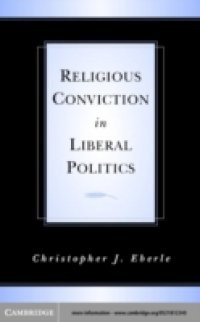What role should a citizen's religious convictions play in her political activities? Is she, for example, permitted to decide on the basis of her religious convictions to support laws that criminalize abortion or discourage homosexual relations? Christopher Eberle is deeply at odds with the dominant orthodoxy among political theorists about the relation of religion and politics. His argument is that a citizen may responsibly ground her political commitments on religious beliefs, even if her only reasons for her political commitments are religious in nature. His ideal of citizenship allows citizens to engage in politics without privatizing their religious commitments, and yet does not license mindless and intransigent sectarianism. An inherently controversial book that offers a substantial challenge to political liberalism, it will be read by students and professionals in philosophy, political science, law and religious studies, and general readers seeking insight into the relationship between religious commitments and liberal politics.

